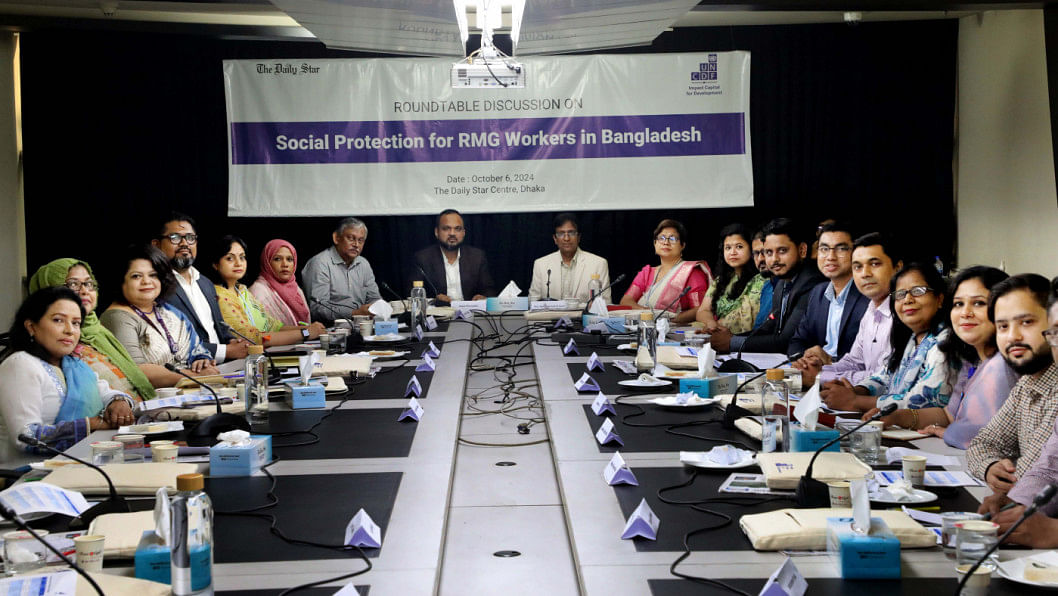Enhancing Awareness of Social Protection Benefits for RMG Workers

Many garment workers in Bangladesh are unaware of the benefits from the Central Fund, a major social protection mechanism established for their welfare. This was discussed at a roundtable titled "Social Protection for RMG Workers in Bangladesh," jointly organized by The Daily Star and the UN Capital Development Fund (UNCDF). Experts discussed many other challenges and the importance of raising awareness on social protection among Ready-Made Garment (RMG) workers in the event. The event was held under the Oporajita: Collective Impact on Future of Work in Bangladesh initiative, supported by the H&M Foundation.
Since its establishment in 2016, the Central Fund has collected 0.03 percent of apparel export proceeds annually to support workers. The fund aims to provide healthcare, financial aid, and education support to garment workers and their families, yet due to lack of awareness, lengthy process and faulty NID cards, many are unable to access these essential benefits. Md Abdus Samad Al Azad, Director of the Central Fund, highlighted that faulty NIDs remain the biggest challenge. He also mentioned ongoing efforts to digitize fund disbursements and simplify the process by resolving Mobile Financial Services (MFS) complexities and exploring alternatives to NIDs.
A recent UNCDF study, part of the Oporajita initiative, revealed that many RMG workers remain unaware of the social protection benefits available to them. Sakshi Chadha, digital expert at UNCDF Bangladesh, emphasized the urgent need to address this gap, given that Bangladesh's RMG sector employs over four million workers, contributing 10.3 percent to the national GDP. Sakshi noted the importance of ensuring income security, health, and safety protections for these workers, particularly in light of the vulnerabilities exposed by the COVID-19 pandemic.
To bridge this awareness gap, UNCDF is planning a comprehensive campaign to educate workers, factory management, and trade unions about the available benefits and the process to access them. This campaign aims to empower workers with the knowledge needed to better understand and utilize social protection mechanisms, enabling them to make informed decisions regarding their welfare.
The roundtable also focused on the future of work for RMG workers, particularly in the face of automation and digitalization. Drumond Fernanda, Strategy Lead for Inclusive Societies at the H&M Foundation, stressed that nearly 2.7 million RMG workers could lose their jobs in the next two decades due to automation. Women are particularly at risk, as many hold roles that may be replaced by automation due to their repetitive nature. In response, the H&M Foundation, through the Oporajita initiative, has partnered with several organizations to prepare workers—especially women—for these changes by developing skills in leadership, digital literacy, and alternative livelihoods. The initiative also addresses gender norms and provides parenting support and healthcare services for workers.
The roundtable brought together government officials, factory owners, union leaders, and NGOs to discuss solutions for improving access to social protection. Shariful Islam Chowdhury, project analyst at UNCDF Bangladesh, recommended digitizing the Central Fund and integrating factories with the Universal Pension Scheme to ensure workers can fully benefit from available programs.
In addition, participants called for enhanced collaboration between RMG associations and government bodies to streamline processes and raise awareness. Joly Talukder, vice-president of the Bangladesh Garment Sramik Trade Union Kendra, urged the government to publish a white paper on the Central Fund to ensure transparency and accountability.
Efforts to improve the welfare of RMG workers must also include better awareness of healthcare facilities and educational support. ANM Saif Uddin, chairman of the Standing Committee on International Labour Organization (ILO) and Labour Affairs at the Bangladesh Garment Manufacturers and Exporters Association (BGMEA), shared that the BGMEA has built several schools and healthcare centers for workers, yet many remain unaware of these resources.
Bringing all social protection measures under a unified framework was suggested by Fazlee Shamim Ehsan, executive president of the Bangladesh Knitwear Manufacturers and Exporters Association (BKMEA). Such a framework would ensure better access to benefits and more efficient monitoring by the authorities, helping RMG workers receive the social protection they deserve.
The roundtable highlighted the pressing need for collaboration between the government, private sector, and labor organizations to enhance social protection for millions of RMG workers in Bangladesh, many of whom are unaware of the safety nets designed to support them.
By raising awareness, improving digital access, and addressing administrative challenges, this initiative aims to make social protection more accessible and functional for the country's vital RMG workforce.

 For all latest news, follow The Daily Star's Google News channel.
For all latest news, follow The Daily Star's Google News channel. 



Comments